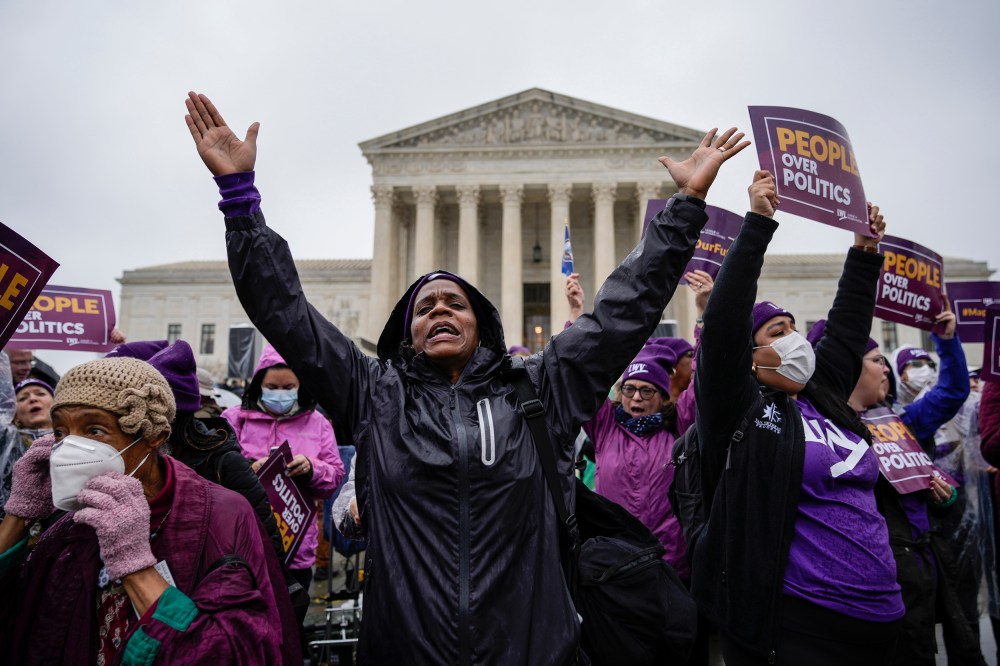In three rulings handed down Friday by the North Carolina Supreme Court, extremists who have worked to consolidate power in Republican hands effectively achieved a political coup — at least temporarily. The court’s decisions give Republicans free rein to draw voting maps that favor their candidates in future elections, create a new and unnecessary barrier for voters through a restrictive ID requirement and disenfranchise 55,000 formerly incarcerated citizens.
In three rulings handed down Friday by the North Carolina Supreme Court, extremists who have worked to consolidate power in Republican hands effectively achieved a political coup.
Thus, in a single day, the court reversed the hard-fought wins of a decadelong movement to expand democracy in North Carolina. Some have framed this as an attack on Black people, but it is more than just that. By attacking democracy, these partisan extremists have harmed everyone.
Surely, those rulings have caused some to despair. If extremists can get away with using the highest court in the state to rubber-stamp their anti-democratic efforts, what are we to do? First, we must remember that this isn’t the first time that government officials in the South, sometimes officials in all three branches, have acted to subvert democracy. Our foreparents fought against slavery and Jim Crow and won when every public institution was allied against them. It’s our time now, and we don’t have a right to feel sorry for ourselves.
What Republicans are doing in North Carolina and, to a larger extent across the country, is what anti-democracy forces did in the late 1870s to reverse the gains made during Reconstruction and to resist the changes demanded by the Civil Rights Movement and women’s rights movements in the 1960s and ’70s. They may target Black people, liberal and progressive voters or the formerly incarcerated, but the truth is that they hurt most people by making it harder to pass policies that help those at the bottom and cause everyone to do better.
Separate cases in state and federal court found that the same GOP-controlled Legislature drew maps to favor voters most likely to re-elect them rather than allowing voters to choose their representatives. These maps were a direct response to the expansion of voter access through same-day registration and early voting that our moral fusion movement won in North Carolina in 2007. After investing millions of dollars to take control of the statehouse in 2010, these extremist Republicans tried to draw maps that would lock them into power.
In 2022, North Carolina’s first federal election without the gerrymandered congressional district maps, the Republican/Democrat split went from 10-3 to 7-7 (an additional seat was added after the 2020 census). But now, according to Friday’s ruling, if Republicans manage to draw a map that gives Republicans the advantage in 14 districts, the state’s Supreme Court doesn’t see any means by which it could block them.

Another ruling on Friday overturned the court’s previous decision that voter ID violates the state constitution. The tactic of imposing a restrictive voter ID requirement was introduced by the North Carolina Legislature in 2013. Growing out of the “Moral Monday” movement, which challenged the Legislature in weekly protests that summer, a broad coalition of women, students, African Americans and churches challenged the ID requirement and other voter suppression tactics in N.C. NAACP vs. McCrory. And we won. The case went all the way to the U.S. Supreme Court, which upheld a lower court’s opinion that the voter ID requirement they had tried to impose targeted African Americans with “almost surgical precision.”
As for the ruling that disenfranchises those who’ve been in prison, Republicans may play populists on television, but in successfully pushing to undo last year’s decision that gave the ballot to formerly incarcerated people, they acted on what the data show: The more people who vote, the less likely Republicans are to win.
Despite the awfulness of those rulings, now is not the time to claim defeat.
Despite the awfulness of those rulings, now is not the time to claim defeat. There is work to do.












